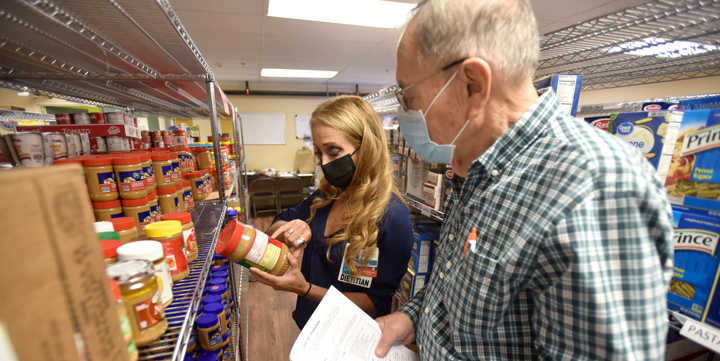<< Back
HHC Partners with Community Food Bank to Ensure Healthy Diets for Chronic Conditions

September 13, 2021
When Pawcatuck Neighborhood Center Executive Director Susan Sedensky sat down a few months ago with Joseph Zuzel, the new manager of community health for Hartford HealthCare’s East Region, it was a true meeting of the minds.
“It was amazing,” she recalled. “Joe was talking about his vision, and I was talking about my vision, and we learned we had the same vision! We both want to educate community food pantry clients on healthy food choices. I have been wanting to do this forever, to educate people about their food.”
Together they created a program unique to the East Region — a Backus Hospital-based registered dietician, Katie Field, held two information sessions at the PNC in July and August to teach first staff and then volunteers about food choices specific to several health conditions, including kidney disease, heart disease and diabetes. HHC is also providing laminated handouts to help guide staff and volunteers as they pack food boxes for distribution, and additional flyers to provide to pantry clients.
“My goal with community health in the East Region is to create collaborations and partnerships that have a long term positive effect on the health of residents across the region,” Zuzel said. “By teaming up with the PNC to help provide people with the best foods for their specific health and dietary needs, we are truly embedding ourselves in the wellbeing of the community.”
In 2020, the PNC food pantry served 1,500 families in the greater Stonington area, an increase of about 200 families that Sedensky attributes to the economic hardships brought on by COVID. In addition, every Friday it sends home “Weekend BackPacks” with enough food for two days, with about 300 children. The food pantry is open five days a week, utilizing curbside pickup. In-person “shopping” was halted by the pandemic. Each family typically takes home 4-5 shopping bags/boxes a week, filled with staples, canned goods, fresh vegetables from the PNC community garden, meats and dairy.
“Being able to create food boxes for clients who have specific health issues will be incredible,” Sedensky said. “We often hear from clients that they have a new diagnosis, and it can be overwhelming to them. This is an easy way for us to help them.”
Field provided training on healthy diets for patients who have heart disease, kidney disease, and diabetes. She also shared strategies for getting people to try new foods that will be better for their health.
“Don’t present it as, ‘You can’t have this …’,” she counseled. “Instead, present it as ‘Here’s everything you can have, and let’s try and limit these things.’ We want to always focus on fresh or frozen versus processed or canned. They might not be used to that, so take it slow.”